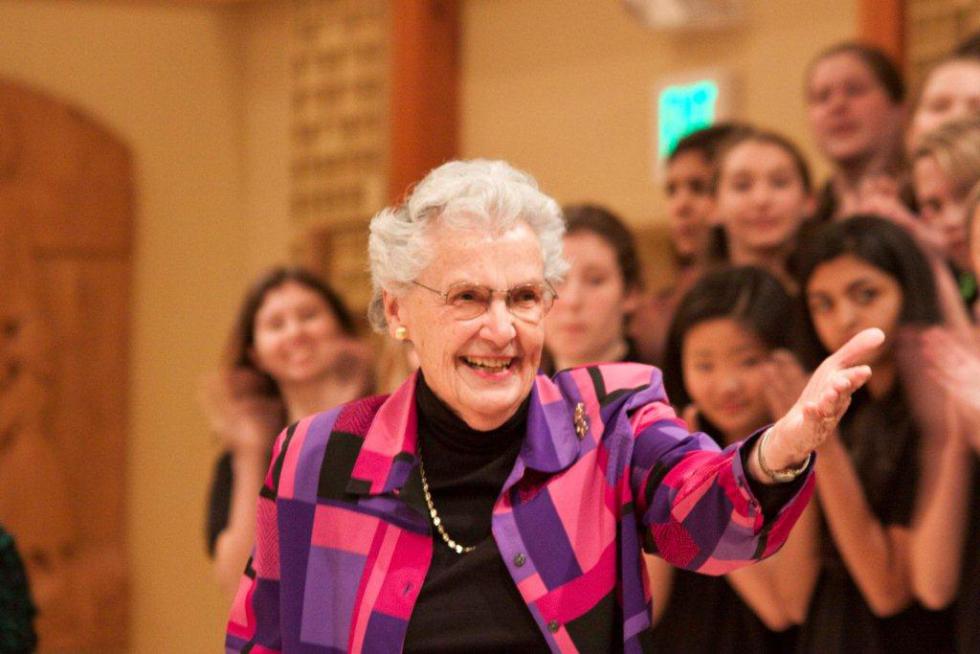It’s all about the melody. Alice Parker, who turns 90 on December 16th, has an important goal — to return choral music to what she calls the heart of singing. She uses no electronics, and no accompaniment in the workshops she gives throughout this country and in Canada.
Alice Parker began her quest for melody after realizing that people have forgotten how to form a connection in song. In her “community sings,” she works with amateurs of all ages, including those who claim to be tone deaf.
“I’m not looking at people and saying, ‘Now hold your tongue this way and this is the way the sound will come out.’ Or ‘Can’t you read the page?’ because there’s no page involved. And I’m just saying, ‘Listen,'” Parker says. “We’ve forgotten how to use our ears, and this connection between the ears and the mouth, that the mouth should be able to echo what the ears heard.”
On a summer night at a small white church in Charlemont, some 60 people sing a hymn chosen by Parker. At first, she says they do what many church congregations do — they sing loudly, and not necessarily musically. But after a few minutes of guidance from their leader, they produce music that’s more dance-like and much more expressive. And that includes those tone-deafers.
Using a technique called “lining,” Parker teaches by singing the lines herself.
“Oh, Shenandoah, I long to hear you,” Parker demonstrates.
Then she asks people to reproduce what they’ve just heard.
“And if they sing back to me, ‘Oh, Shenandoah, I long to hear you,’ I know they’re looking at the page and what they’re seeing are those black blobs. They haven’t listened to what I sang them,” Parker explains. “So I say, ‘Listen and I do it again.’ And then it may be a little bit better and I say, ‘No, listen,’ and they kind of catch on.”
“Music isn’t on the page,” she says. “It can’t be correct to the page because there’s no sound on the page. It has to be correct to the song, correct to the ear.”
Some of Parker’s first musical lessons came from her grandfather, who bounced her on his knee while singing, “Buffalo gals, won’t you come out tonight.” At Smith College, Parker learned about conducting and composing. She went on to study choral conducting with Robert Shaw at Julliard, leading to a 20-year collaboration as the principal arranger for Shaw’s Chorale.
For more than two decades, the Robert Shaw Chorale toured internationally, winning several Grammy awards. A 1947 Time magazine article on the group featured Parker on its cover.
In 1976, Parker’s husband had a fatal heart attack, leaving her to care for her five mostly teenaged children.
A decade later, she founded Melodious Accord, a program that includes her workshops and a 16-voice professional choir. Also — a summer program brings young musicians to Singing Brook Farm, land that’s been in her family for generations. Participants study Parker’s technique. Choral conductor Gerrit Scheepers is from Johannesburg, South Africa.
“I think the most important thing I’ve learned these past few days is that one should always start with the text,” Scheepers says. “And if you know the text really well, it will evoke certain emotion that you feel, and then the melody and everything else will just come naturally.”
Parker’s teaching methods and her unassuming personality have made her a much-beloved figure among singers, conductors and composers. She’s received six honorary doctorates and awards from all the major music organizations in the country.
Wayne Abercrombie, professor emeritus of choral music at UMass Amherst, has sung and conducted Parker’s works. He says she always focuses on bringing choral music back to the basics.
“It never gets beyond human beings, singing together, using their voices well…leading, music that you can respect, compositions you can respect,” Abercrombie says. “She’s just always on message and demonstrating how it’s done. ”
And it’s not just about teaching. Parker has also composed more than 500 pieces, often setting her music to work by well-known poets, including Emily Dickinson.
“The kind of poetry that I like is a kind of stripped-down language that…gets at the marrow of what the experience is at the center,” Parker says. “And what the music does is provide the context for that marrow.”
Parker’s still composing for commissions she receives from community, school and church choruses.
At nearly 90, she’s had to cut back a bit on her traveling from one trip a week to one a month. But she says she plans to continue sharing her love of music for as long as she can.
“I think it is meant to unite us as human beings in a way that nothing else can,” Parker says. “If we’re arguing with our rational minds we’re talking about what divides us. If we are singing with our intuitive minds we are concentrating on what unites us, our common human experience and all the kind of life experiences can bring to us can be sung about.”
To celebrate her birthday, choral groups from around the country are posting performances of Parker’s work on YouTube. It’s part of a project called “Alice is 90.” And her arrangements of folk-songs, hymns, spirituals and Christmas carols are still being performed all over the world.
